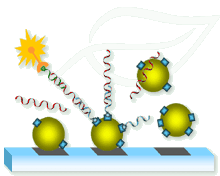|
|
 |
 |
 |
FastScan is a rapid molecular test system for the detection of a variety of microorganisms. FastScan is based on the detection of target molecules of the microorganism of interest by means of genus, group or species specific capture and detection probes in a so-called sandwich hybridization.
The target molecules of the microorganisms of interest contained in the samples are captured either by a specific coated microtiter plate or by midget magnetic particles. Additionally to the capture probe, a detection probe is coupled to the target molecule to which an enzyme is attached afterwards in a further incubation step.
All unbound sample components are removed by several washing steps, so that only the microbes of interest, e.g. microbial contaminants, starter cultures or pathogenic microbes, are detected in a highly specific way.
The signal read-out is carried out optically by absorption measurement of an enzymatically generated colour change or electrically by measurement of an electrical current on a so-called biochip.
The data analysis is performed with the specifically for the FastScan rapid test developed FastScan-Software.
|
Analysis of microorganisms with the easy to use FastScan kits, a microplate reader and the FastScan software
How does it work? |
The benefits of the FastScan rapid test system
- rapid, sensitive and reliable
- time saving of 5 to 7 days in comparison to cultivation based assays
- easy to use
- minimized sample preparation procedure
- significant reduction of the analytical costs
- more reliable results and higher information content compared to cultivation-based assays
- high sample throughput by means of 96-well microtiterplates
- high flexibility (group or organism specific detection and identification)
- simultaneous detection of different microorganisms in only one test (multiplex analysis)
|
|
|
 |
|
